How is your reading going? Tell us!
Thank you to everyone reading with us — whether you participate in the discussion or not, we love you! Thank you to those who left their thoughts in the comments last week. Feel free to add your ideas at any time (or not). I, for one, am always inspired to write after reading Kate Briggs, so I wrote up some initial responses to This Little Art and also to the Barthes, and you can find them in the comments (linked above). I hope to continue to do this as time allows. If you are on Twitter, you can follow the discussion at #KateBriggs24 and on Bluesky at KateBriggs24.
Keep reading to find some of the first week’s posts and comments I rounded up below.
Schedule
Here’s what we are reading for the upcoming week:
Resources
My co-coordinator Kim McNeill has added many links to the #KateBriggs24 webpage, including links to books referenced in our reading so far and a list of the smaller books and projects Briggs has done.
Angela Newland found these recordings of Barthes delivering his lectures — thank you so much, Angela! You made book Twitter happy.
The lovely people at Barthes Studies pointed us to an article written by Briggs about The Preparation of the Novel: “Augmentation infinie de la mayonnaise: On the New Edition of Roland Barthes’s La Préparation du roman.”
On p. 53 of This Little Art, Briggs refers to an interview Zack Friedman conducted with Renee Gladman, “Language and Landscape: Renee Gladman.”
On p. 55, Briggs refers to an article by Rachel Cooke: “The Subtle Art of Translating Foreign Fiction.”
Discussion
For those of you not on social media, or who just happened to miss some of the discussion, here are a few posts from the week.
From rpmoon.bsky.social. I’m inspired to ask: if you underline in your books, what was your first underlining in This Little Art or The Preparation of the Novel?
An important quotation from my co-organizer, Kim McNeill, who takes the best book pictures:
From Liz McCausland with a great point about the opening scene:
This tweet from Dr. Minx Marple, aka Isabella Streffen, made me laugh — and relate because I will be doing this soon too:
Some inspiration from our friends at Atmospheric Quarterly, a literary magazine that will be wowing us all soon:
From Nicholas Greco, introducing a concept that will be important to us as we move forward:
A beautiful comment from Kasey Jueds, who summed up my thoughts and questions about what this project we’re doing actually is:
When I mentioned this read-along to a friend, she was curious about the difference between a read-along and a book club or group. After admitting that I don't really know :), I wondered whether read-alongs can place greater emphasis on process—commenting/sharing/being together all the way along as we're immersed together in these books, and not just at the end when we've finished (which, I feel already, Kim, will be a sadness! Because we'll be done!). And celebrating, as we connect, being exactly where we are in our reading/thinking/feeling about Kate Briggs and Barthes.
And, finally, this picture of Isabella Streffen’s gorgeous workspace, with our #KateBriggs24 reading schedule printed out and pinned to the wall!!!
Thank you everyone, for making the first week totally amazing!
Rebecca and Kim
Find Kim on Twitter, Bluesky, and Instagram*
Find Rebecca on Twitter, Bluesky, and Instagram*
*Our Instragram accounts are locked, but we welcome bookish friend requests





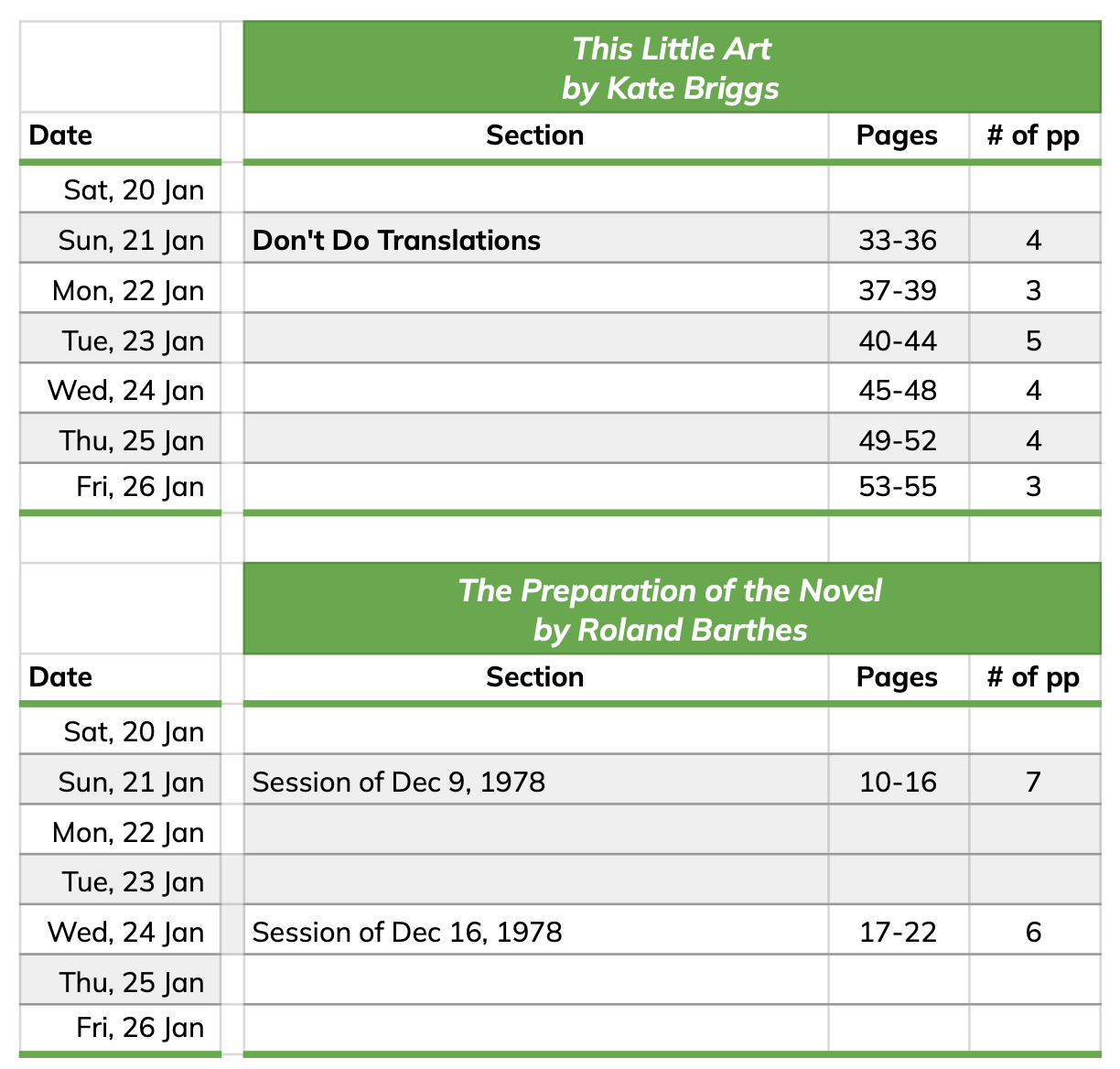
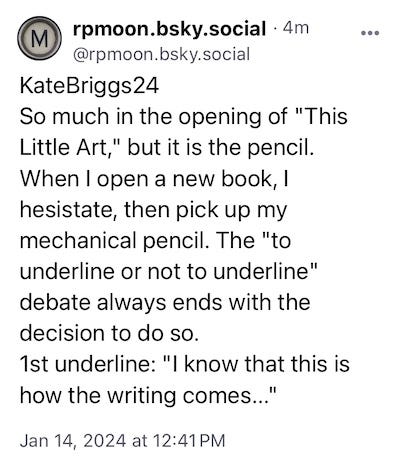
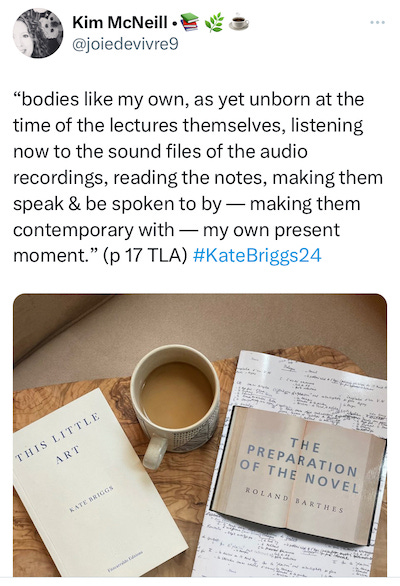
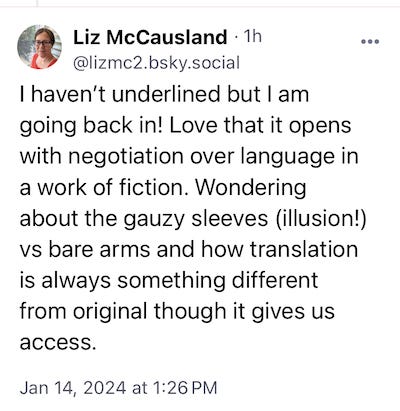
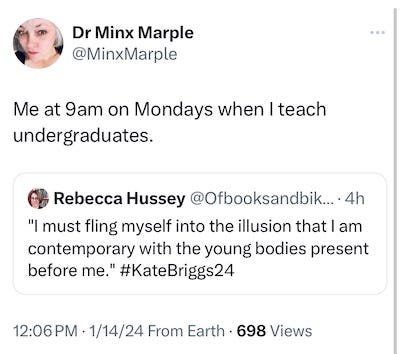
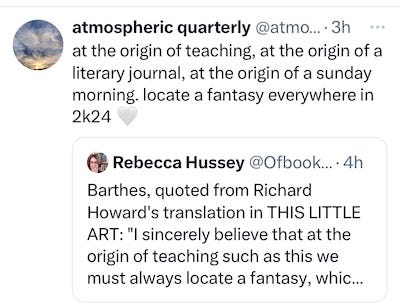
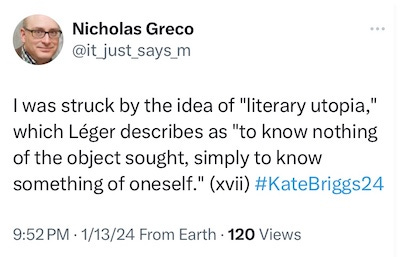
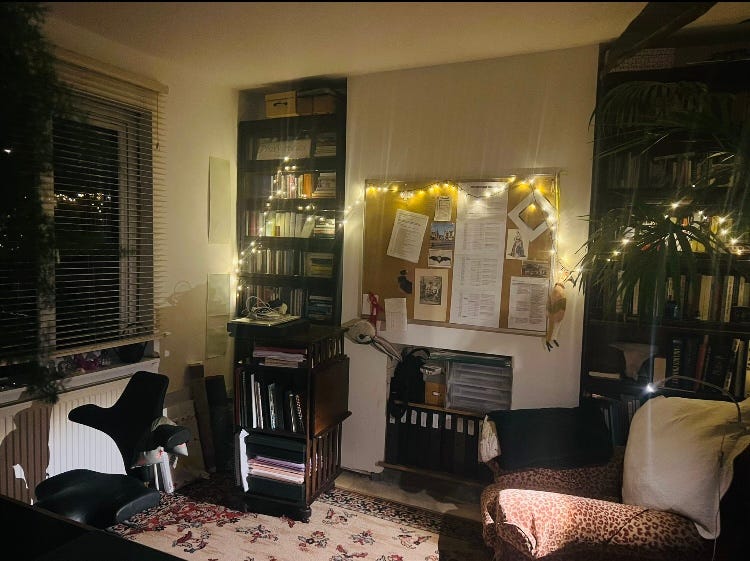
For those not on social media, here's what I highlighted from today's (Sunday 1/21) reading on Twitter/Bluesky:
From the Briggs: I love the shift from "What exactly did I want?" to "what is it that you have found in the practice of translation?" The 1st is about the singular, static self (who are you and what do you want?); 2nd is about practice/experience (who do you become when you translate?).
We are back to garments (gauzy sleeves): Helen Lowe-Porter on herself as translator: "this unknown instrument" that will serve Mann "to change the garment of his art into a better one which might clothe her for the market place until times changed." Or, in Briggs's terms, a lady's maid, "undressing and carefully re-dressing the literary work of art for the purposes of a new market."
Barthes: "I'll not be taking account of the historical sociology of the Novel...I'll not dispute any of this, but the Fantasy shan't be paralyzed by it ... Nor shall I let myself be daunted...by the question as to whether it's possible to write a novel TODAY."
Barthes made me laugh -- the sexual fantasy/novel fantasy connection, the sidelining of whole fields of novel study, the admission of his bad memory (which I relate to).
I LOVED both readings today.
Briggs, p. 37-44 (I'm catching up a bit): The idea of "supporting texts" is beautiful, and I can't help but think about how Kate Briggs's own books are supporting texts for me, and I can see that Roland Barthes's books might become supporting texts as well.
I LOVE the bit about Barthes's students contributing to the lecture series through conversations, notes, etc., and "redirecting the path of the research toward their own different concerns, which might be one way of describing to myself what I think I am doing here." What IS writing, conversation, research about texts but that kind of redirecting towards our own concerns? And it's a way of thinking about what we're doing with our own project -- speaking with Briggs and Barthes, speaking back to them, making our own meaning of their ideas, redirecting them towards our own concerns (as I do when I use Barthes to help me think about turning 50).
I also love Briggs's loyalty to the FEELING of having actually read a book when we have read the translation, of having had an authentic aesthetic experience with that book, an experience we should take seriously and honor. Because there are so many variables when reading a book, so many circumstances that can affect how we read, and translation is just one of them. I don't remember if she goes on to complicate this idea, but I love the stopping point here: "There he is, and this is what he's thinking, and this is how he feels."